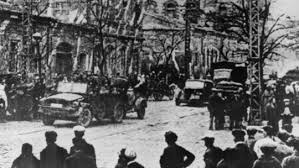I was very sorry to read that Johanna Fiedler has died.
In the 15 years she ran the press office at the Met (1975-89), she told as much truth as she was able and (to me, at least) no outright lies.
Later as an independent writer, she wrote biographies of her adored father Arthur, conductor of the Boston Pops, and a finely balanced history of the Met, Molto Agitato, which was deprecated in the New York Times for not peddling enough gossip. Read carefully, it told more than most appreciated at the time about the long-running trials and tribulations of James Levine.
Outside the Met, Johanna did not have a happy life. A difficult romance with a conductor who was tipped (like so many) to succeed Levine came to naught and I never found it easy to make her laugh, likeable as she was. Johann was only 65 when she died, too soon.
Since she left, the Met has showed a stonier face to the media world.

book jacket portrait/ Nan Talese/Doubleday
Good research in court documents by Peter Dobrin at Philadelphia magazine shows that Philadelphia Orchestra CEO Allison B. Vulgamore is being paid something in the region of $597,000.
She has agreed to a reduction of 20 percent in light of the orchestra’s financial crisis, but that’s still a handsome takehome for the head of a struggling orchestra. A decade ago, the incumbent earned less than $200,000.

Her chairman says: ‘We’re very fortunate to have someone as talented as Allison Vulgamore to guide us through this challenging period’.
Here’s the link to Peter’s fine story.
It has been a tough year, reports Bloomberg, and everyone’s taken a cut.
But before you reach for the hankie, the top stagehand still made half a million bucks and Sir Clive didn’t do too badly.
Story here.

She was 85, a Londoner and a regular trouper in our theatre life. BBC broke the news.

And here’s the very speedy Guardian obit.
Very sad to hear that Josephine Hart died today of cancer.

She was best known as the author of Damage, which was filmed with Jeremy Irons, and as the wife of advertising baron Maurice Saatchi.

But she will be most fondly remembered for the evenings at the British Library where she got major actors to read poetry, much of it new, for an invited audience, most of which would never spae the time for poetry.
I met her first the night she had Harold Pinter reading from his uncollected verses. She was a passionate missionary of poetry in all its forms. She will be very widely missed.
Thrilling news from The Sondheim Review that a national CBS television audience is going to be treated to chunks of Company at primetime on June 12. Do not go out that evening. The entire production will also go to selected movie theatres.
Here’s the data:
The April 2011 Company with The New York Philharmonic was filmed in Avery Fisher Hall at Lincoln Center and will be broadcast to a limited number of movie theaters in the USA and Canada. This will be one of the first “Broadway-casts” of its kind, beginning Wednesday evening, June 15, 2011. There may be additional broadcasts, depending on the response. Additional locations may be added, so visit this link.
Distributed by Screenvision, this is the production that starred Neil Patrick Harris, Patti LuPone, Stephen Colbert, Jon Cryer, Christina Hendricks, Craig Bierko and Martha Plimpton.
Much of the Company cast will re-assemble to perform live for the Tony Awards on CBS on Sunday evening, June 12, 2011. (Check local listings.)

In a recent review of Jens Malte Fischer’s disappointing German best-seller of a Mahler biography, I deplored Fischer’s unquestioning dependence on a man who is widely held to be the post-War champion of Mahler scholarship in western Germany.
His name is Hans Henrich Eggebrecht and many of the leading musicologists at German universties are his worshipful apostles. I was never much convinced by Eggebrecht’s Mahler convoluted analyses, which misread the composer’s complex multicuturalism as an arid theory of ‘vocabularies’ … something very remote from the clashing civilisations of Mahler’s world.
Last year, Eggebrecht was exposed as a Nazi. Not just any old Nazi but a rampant enthusiast who took part in a massacre of Jews at Simferopol in the Crimea.


(roundup and memorial monument at Simferopol)
The professor’s faithful followers have been trying to cover this up, but there’s a biography out soon

and we should know before long how this racist murderer changed his views after 1945 to become a Mahler proselyte.

(photo: zeit.de)
Here’s what I wrote about him in the New Statesman:
Far more influential was the Freiburg professor Hans Heinrich Eggebrecht (1919-99), who introduced two generations of German readers to Mahler and 20th-century music. There is a small problem with Eggebrecht. Until 1945 he was, all now agree, a dedicated follower of the Führer. Recent research suggests he was much more than that. According to his biographer Boris von Haken, in an article published last year in Die Zeit, Eggebrecht was a member of the Feldengendarmerie division 683, which in December 1941 committed a mass execution of Jews at Simferopol, in the Crimea, murdering more than 14,000 men, women and children over three days. Some of Eggebrecht’s devoted pupils, now also leaders in German musicology, have sought to absent him from the unit on the days in question. However, Haken has produced proof that he was present on at least one day of the massacre.
After the Second World War, Eggebrecht falsified his service record and became an academic. He may have taken up Mahler and modernism as cover, or atonement, for his horrendous crimes. Whatever the reason, he treated Mahler’s Jewishness as a pathologist treats a corpse. It appears as one of many Mahlerian “vocabularies” – a term he invented to embrace the composer’s troubling eclecticism. Eggebrecht’s work was never translated into English but it gets honourable mentions at academic conferences and in dissertations.
Good to see the turbulence has not yet settle in the classical music business – good, because if ever there was a time for fresh thinking with orchestras going bust and audiences getting old this surely is it.
I can report, three days before the official announcement, that Esa-Pekka Salonen has found himself a new agent. Salonen spent his whole career with Van Walsum until the owner told him he was getting out and the conductor would be better off with a call-minder on his phone than a 20 percent toll on his earnings.
Well, E-P has had a year to reflect on that sound advice and decided he’d rather pay an agent.

The one he’s chosen is pretty exclusive. Mark Newbanks of Fidelio Arts represents Gustavo Dudamel. That’s it. Just Gustavo, plus the even younger French conductor Lionel Bringuier.
Until today, when he signed Esa-Pekka. The Finn was Gustavo’s predecessor at the Los Angeles philharmonic. They get on well. The arrangement makes good sense and Mark will give him as much personal attention as he requires.
Who needs agents? Salonen has been thinking about that awhile and decided he does.
This is the piece on changes in the festival industry that was aired last week on WQXR. Here‘s the English original, and here the Chinese.
???????
?/??·????? ?/?? ??????????
???????????????????????????????????????????????????????????????????????????????????????????????????·??(Evgeny Kissin????????????????????????????????Glyndebourne????????????????????????????·?????Menahem?Pressler?“?????”???????????????
?????????????????????????????????????????????????????????????????????????????????????????????????????????????????????????????????????????????????600??????????
???????????????????????????????????????????????-??????-??????????????????????????????????????????????????????
?????????????????????????????????????????????????????21???????
??????????????????????????????????????????????????????????????????????????????????????????????????????????????????????????
2009????????????????????????????????60%??????????????????????????????????????????????????????????????????????????????????????????????????????????????????????????????????????????????????????????????????????????????????????
???????????????????Glimmerglass?????????·????Francesca Zambello??????????????????????????????????????????????????????????????????·????Deborah Voigt????????????????Annie Get Your Gun??
????????Ojai????????????????·????Dawn Upshaw????????????????Purcell????·????George Crumb??????????????????????????????
???????????????????????????????????????????????????????????????????????????????Tanglewood????????????·???James Levine???????????????????????????????????????Koussevitsky???????????????????????Ravinia??????????Blossom?????????Aspen?????????????????????????????????
?????????????????????????????????????????????????????????????????????????????????????????????????????????????????????????????????·?????Cathal?Breslin???????????????·??Sabrina Hu?2008?????Derry???????????????“????????????????????????????????????????????????????”
????????????????????????????????????????????????????????????????????????????????????????????????????????????????????????????????????????????????????????????????????????????????????????????????????
???????????BBC???????
Hans Keilson, author of a Kafkaesque novel of Nazi Germany called The Death of Advocacy, died yesterday at the age of 101.
The book, published half a century ago, was recently rediscovered and is becoming a runaway bestseller in the manner of Suite Francaise by Irene Nemirovsky. Unlike Nemirovsky, Keilson lived long enough to experience vindication.

Here’s the publisher’s blurb:
��������� �� ����� ��������������������������� ��First published in English in 1962 (and in Germany in 1959), The Death of the Adversary is nowback in print almost half a century later. Within six weeks of being published in the US last year,the novel sold 30,000 copies, becoming a New York Times bestseller. A semi-autobiographical account of life under Nazi-occupied Europe, The Death of the Adversary was written whilst Keilson was in hiding during 1942 and the pages then buried in his garden for safekeeping forthe duration of World War II. It is an affecting account of what he outlived. Keilson’s first novel,Life Goes On, was accepted for publication just before his twenty-third birthday in 1933 and wasthe last novel that Fischer Verlag was allowed to publish by a Jewish writer before theNuremberg race laws came in to effect.The Death of the Adversary is a portrait of a young man helplessly fascinated by an unnamed ‘adversary’ whom hewatches rise to power in 1930s Germany. It is implicit – though never stated – that our narrator is Jewish and hisadversary is Adolf Hitler.
Like Suite Française, the novel captures firsthand the minutiae of fear, anger, denial andperseverance that accompany life under the shadow of tyranny. The Death of the Adversary is also a tale of horror,not only in its evocation of Hitler’s gathering menace but also in its hero’s desperate attempt to discover logic wherenone exists.‘With seeming effortlessness, Keilson performs the difficult trick of showing how a single psyche can embrace manycontradictory thoughts, and how naturally extreme intelligence and sensitivity can coexist with obtuseness, denial andself-deception. To say that reading this novel makes it impossible not to understand how so many European Jewsunderestimated the growing menace of Nazism is to acknowledge only a fraction of its range. In fact the novel showsus how many human beings, in any place, at any time, protectively shield themselves from the most frightening truthsof their private lives and their historical moment’ .
LATE Extra: There’s a fine obituary in the Times, June 3.
On their Facebook today, the British group declare solidarity with their pro-Pal colleagues who have made a new campaign record.

‘Some of our friends are involved in OneWorld’s new ‘Freedom for Palestine’ single – you can find out more at http://www.waronwant.org/freedomoneworld/‘ – is what they write.
Coldplay are, I think, the first major group to embrace the PLO/Hamas agenda.
Nice to read in Ha’aretz that Dame Kiri te Kanawa is making special mention of the late Vera Rozsa during her current tour of Israel.
Vera, who died in November, was London’s most influential singing teacher. Her only son lives in Israel and she once talked of moving there.
Plans were being made for a memorial concert in London. Have I missed it?




Aline_Paley_medium_image.jpg)


